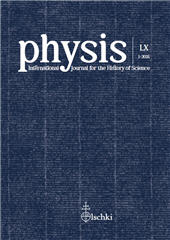Algebra in Transit in Late Medieval and Early Modern Europe
P. 1-30
Secord (2004) suggested that historians of science eradicate the distinction between the making and the communicating of knowledge. While highly influential, Secord's suggestion has rarely been applied to highly abstract bodies of knowledge, such as mathematics. The paper argues that the tradition of European late medieval and early modern practical arithmetic provides a significant case study to understand the development of new mathematical knowledge as emerging from processes of transmission, translation, application, and adaptation of knowledge. This approach makes it possible to understand the development of mathematical knowledge as an incremental process, and to shift our focus from primacy and innovation to transmission and evolution, and from individual innovators to distributed agency.
First, the paper locates the emergence of proto-symbolic algebra within the broader exchanges in knowledge and technology that characterised the late medieval Mediterranean. It then reconstructs the evolution of proto-symbolic algebra in western Europe until the end of the sixteenth century as embedded in processes of knowledge transmission. [Publisher's text]
78606 characters
-
Articles from the same issue (available individually)
-
-
Information
DOI: 10.1400/300583
ISSN: 2038-6265


